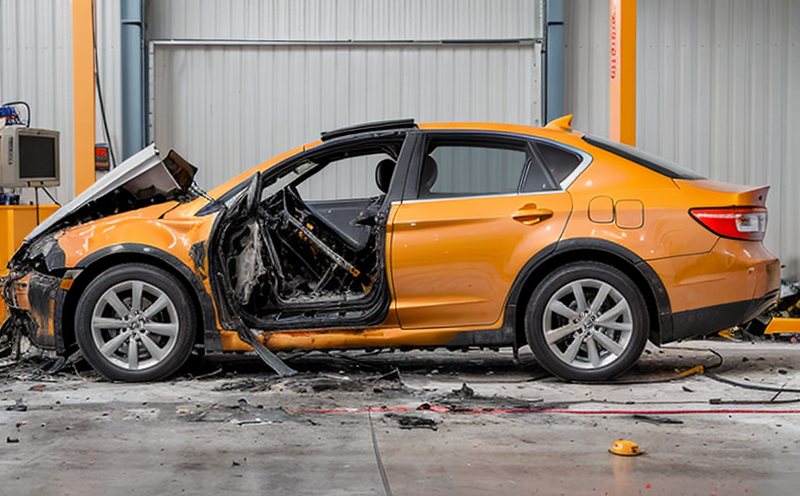EN 62619 Mechanical Abuse Testing of Industrial Lithium Batteries
The European Standard EN 62619:2014 provides a framework for the mechanical abuse testing of industrial lithium batteries. This standard is critical in ensuring that battery systems are robust and reliable under real-world conditions, particularly in sectors where safety and performance are paramount. Compliance with this standard can help manufacturers meet regulatory requirements while enhancing brand reputation and market competitiveness.
The EN 62619 protocol encompasses a series of mechanical abuse tests designed to simulate the potential stresses that industrial lithium batteries may encounter during use or transport. These tests include crush, drop, vibration, impact, and temperature cycling. Each test is carefully designed to evaluate the structural integrity and electrical stability of the battery under extreme conditions.
Crush testing applies a controlled force to the battery, simulating potential damage from stacking or accidental dropping. Drop tests assess the resilience of the battery by subjecting it to repeated impacts from a specified height. Vibration tests are conducted to evaluate how the battery withstands environmental vibrations that may occur during transportation. Impact tests simulate blunt force trauma, such as being struck by an object. Temperature cycling tests examine the battery's performance under extreme temperature variations.
Preparation for these tests is meticulous and includes ensuring the correct type of battery cell or module is used, along with appropriate charging protocols to reflect real-world conditions accurately. The testing apparatus must be calibrated to ensure accurate measurement of applied forces and environmental parameters like temperature and humidity. After each test, thorough inspection and electrical characterization are performed to assess any damage or changes in performance.
The results from these tests are reported comprehensively, detailing the observed effects on the battery's structure and functionality post-test. Compliance with EN 62619 is crucial for manufacturers aiming to enter markets that adhere to this standard. It demonstrates a commitment to quality and safety, which can significantly enhance product acceptance.
Manufacturers who undergo EN 62619 testing gain insights into potential weaknesses in their battery designs, allowing for improvements before the products reach market. This proactive approach not only ensures regulatory compliance but also improves overall product reliability and performance. By adhering to this standard, companies can build trust with consumers and regulators, fostering a positive market perception.
The importance of EN 62619 cannot be overstated in industries that rely heavily on battery power for mission-critical applications such as automotive, aerospace, and medical devices. These sectors demand batteries that are not only powerful but also robust enough to withstand the rigors of operation and transport. Compliance with this standard ensures that industrial lithium batteries meet these stringent requirements.
Why It Matters
The mechanical abuse testing outlined in EN 62619 is essential for several reasons, particularly within industries that depend on reliable battery performance. These tests help manufacturers identify and mitigate potential risks associated with the use of industrial lithium batteries.
- Enhanced Safety: By simulating real-world conditions, these tests highlight any areas where a battery's design or materials might fail, potentially leading to safety hazards.
- Increased Reliability: Ensuring that batteries can withstand mechanical stresses improves their overall reliability and extends their operational lifespan.
- Regulatory Compliance: Adhering to this standard is often a requirement for entering specific markets or industries, ensuring compliance with international regulations.
- Market Differentiation: Demonstrating adherence to high-quality standards can differentiate products in competitive markets and enhance brand reputation.
In summary, EN 62619 mechanical abuse testing is crucial for manufacturers seeking to ensure the safety, reliability, and compliance of their industrial lithium batteries. This standard plays a pivotal role in fostering trust with consumers and regulators, thereby enhancing market acceptance.
Eurolab Advantages
At Eurolab, we pride ourselves on providing comprehensive and accurate mechanical abuse testing services that comply with EN 62619. Our team of experts ensures that every test is conducted rigorously according to the standard's specifications.
- State-of-the-Art Facilities: Our laboratories are equipped with advanced equipment capable of replicating a wide range of mechanical stresses, ensuring precise and reliable results.
- Experienced Personnel: Our team comprises highly skilled engineers and technicians with extensive experience in battery testing and quality assurance.
- Comprehensive Reporting: We provide detailed reports that not only document the test outcomes but also offer recommendations for improving design and performance.
- Client-Centric Approach: We tailor our services to meet the specific needs of our clients, ensuring that each testing process aligns with their objectives.
By choosing Eurolab, you gain access to a partner committed to excellence in mechanical abuse testing. Our services are designed to help manufacturers ensure the safety and reliability of their industrial lithium batteries while meeting regulatory requirements.
International Acceptance and Recognition
The EN 62619 standard is widely recognized across Europe and beyond, with many countries adopting it as a benchmark for mechanical abuse testing. Here’s an overview of its acceptance in various regions:
- Eurozone: The European Union recognizes this standard, making compliance essential for manufacturers looking to sell products within EU member states.
- Australia and New Zealand: Both countries have embraced EN 62619 as a key requirement for battery testing, ensuring that imported batteries meet stringent safety standards.
- United States: While not a direct standard, the principles of EN 62619 are often incorporated into U.S. regulations and voluntary industry standards.
- Asia-Pacific: Countries like Japan, South Korea, and China have begun to adopt parts of this standard in their domestic regulations as well.
The global acceptance of EN 62619 underscores its importance in ensuring that industrial lithium batteries meet the highest safety and performance standards worldwide. Compliance with this standard can significantly enhance a manufacturer's market presence and credibility across these regions.





